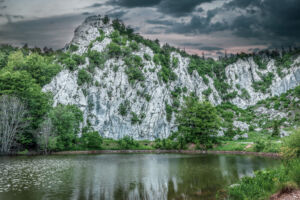Advancing transformational leadership for climate action
TRACTION Collective et al.
Creating transformative spaces to identify new ways of dealing with uncertainties in water resource management – using the example of karst landscapes in Europe
Biosphere reserves have long been model regions for joint learning and action by public authorities, businesses, and residents in complex socio-ecological contexts. They are therefore pioneers in the development of experimental solutions to sustainability challenges in vulnerable landscapes. Due to their importance for species protection and their vulnerability, karst landscapes are considered worthy of protection. At the same time, there are uncertainties in our knowledge of hydrogeological relationships. Biosphere reserves in karst landscapes are prime examples of how stakeholders can deal with uncertainties regarding the consequences of climate change for nature conservation and water resource management.
The InfraSETS research group therefore considers biosphere reserves and other protected landscapes in karst landscapes as transformative spaces – places where innovative ways of sustainable change are being tested. The aim of the project is to strengthen and further develop these transformation spaces and to jointly create new approaches for socio-ecological transformations. In four European karst landscapes, the project team is investigating how uncertainties, scientific expertise, and policy measures can be used for transformative processes. At the same time, new formats for transformation processes are being jointly developed, tested, and implemented.
The investigations focus on four karst landscapes that are of particular importance for nature and resource conservation:
ISOE works closely with partner institutions from these regions to promote transformative approaches and make long-term contributions to social-ecological solutions.
Transformative spaces, in which science and practice work together in a spirit of trust and experiment with ideas and (research) practices, enable transformative developments. They could thus serve as examples for karst landscapes that face particular challenges in nature conservation and water resource management.
The InfraSETS project aims to create transformative spaces on two levels:
Level 1: Research in the regions
Infrastructure elements are being developed in karst landscapes in collaboration with biosphere reserves and partners. These elements include concrete approaches such as exhibitions, risk management strategies, mapping, dialogue formats, and advisory services. The design of these infrastructures is transdisciplinary and is complemented by disciplinary research questions dealing with uncertainties, knowledge, and governance.
Level 2: Transformation of knowledge spaces
In addition, InfraSETS creates spaces for knowledge exchange to promote dialogue between the participating institutions and partners. These formats include collaborative writing, joint learning platforms, and exchange programs that strengthen cooperation.
Infrastructures play a key role in transformation processes – they can accelerate or hinder change. They shape relationships between people as well as between society and nature. For a sustainable future, infrastructures must adapt to new challenges, in particular the consequences of climate change such as more frequent extreme events and changes in water availability.
Sustainable water use in Europe requires dealing with uncertainties and rethinking how we use resources. Working with biosphere reserves as pioneers of change offers valuable approaches to this. It enables us to think beyond short-term solutions and promote transformation processes in how society interacts with nature and resources.
The project “InfraSETS – Infrastructuring Social-Ecological Transformations in Water Management and Nature Protection in Karst Landscapes” is funded by the Volkswagen Foundation as part of its “Change! Fellowships and Research Groups” funding initiative.
TRACTION Collective et al.
What impact does climate change have on our water resources? Is water scarcity also a threat in Germany? What challenges does the water industry face?
Go to Topic Page

